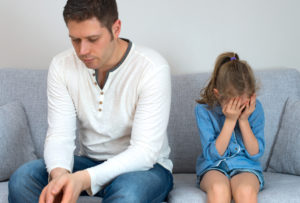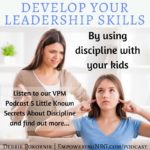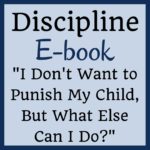Podcast 012 - Discipline, Part 2
Today we are going to continue talking about discipline and focus on 5 secrets that are rarely discussed yet super important if we want to be able to really understand this topic.
Discipline is important to understand because it can influence your effectiveness as a parent and your confidence. which is of course connected to your vibrancy as well as your relationship with your child.
Many parents make the decision to use discipline with their child, only to discover they keep slipping up. Perhaps, despite their best efforts to stay calm and consistent, they over-react, flipping back into practices they promised they would never use on their child and then feeling guilty and ashamed at what they have done.
despite their best efforts to stay calm and consistent, they over-react, flipping back into practices they promised they would never use on their child and then feeling guilty and ashamed at what they have done.
Or maybe they have decided to use discipline, but find that their kids don't listen and their partner, mother (or mother-in-law) keep saying, "You're the problem - you're too soft and inconsistent!"
I can't tell you how many times I've heard a judgmental adult say, "Give me 5 minutes with that kid and he'd be listening!" To me, this is an offensive statement that is totally unfair and, unless they are willing to be abusive or pay the child off, is not even true.
As I mentioned last week, discipline is not soft. It's actually much harder to do than punishment, and it requires self-awareness, training and adjustments to what you have already internalized (from your own youth as well as from society at large).
The problem is, while discipline is currently put out as best practice, the self-awareness, training and support required are not being offered by many. Without this, many parents are doomed to fail and either resort to punishment, become very inconsistent in their parenting or allow their child to run the show.
As a result of this kind of judgement and flip-flopping back and forth, the mom who is trying to discipline, can often feel her vibrancy slipping. She believes it's her own lack of self-discipline that's the problem and fears others finding out. She might feel like her child is running the show and often lacks support from those around her. This is tough on her self-esteem, her ability to be a great parent and her relationship with her child.
In reality, this problem is way more common than any parent would ever dream. It happens for five reasons that people rarely talk about, never mind help us to overcome. Once you are aware of these reasons and begin to recognize them when they arise, this troublesome way of thinking can stop and the real learning can begin.
If you are a parent, teacher, daycare worker, etc., and are trying to use discipline rather than punishment, then this podcast is for you. Even if you are not currently in one of these roles, I'm going to be sharing self-awareness pieces that affect all of us, because discipline goes much further than dealing with a misbehaving child. So stay tuned and rather than listen from a parenting perspective, think of how this information applies to you as an adult.
I started this topic last week when I talked about the difference between Discipline & Punishment and I also have written an e-booklet, I Don't Want to Punish My Child, But What Else Can I do, in case you want more than I cover in the podcasts.
5 Secrets about Discipline...
Secret 1: Discipline is about awakening and strengthening your child's moral code and not about calling all the shots
As I shared in the last podcast, when you use discipline you are not giving your child a list of what's okay to do, and what is not. Instead you are trying to help him internalize a way of living that will guide him in making good decisions throughout his life, whether you are there to enforce things or not. It's about helping your child become  independent and confident in his uniqueness so he can embrace whatever life throws his way and grow to his full potential. [Discipline and resiliency are strongly connected – so if this piques your interest and you haven't listened to my podcast on increasing resiliency you might want to give it a listen after this.]
independent and confident in his uniqueness so he can embrace whatever life throws his way and grow to his full potential. [Discipline and resiliency are strongly connected – so if this piques your interest and you haven't listened to my podcast on increasing resiliency you might want to give it a listen after this.]
In the case of discipline, you're really trying to teach a moral code that your child will use to make all kinds of decisions from in the future and there are two very important things you need to know about this.
First, discipline is taught more through what you do than what you say. This means how you behave must back-up the skills you are hoping your child will internalize.
The good news is that you control you, so while it might not seem fair that your kids learn more from what you do than all the wonderful things you say to them, it still allows you some choice about the behaviours you are promoting.
It's also good to note that most of this modeling is absorbed in the younger years (0 - 7 years), while the teenage years are more about "living it" than "learning it". This means if you only start to pay attention to what you are modeling when you think your kids are old enough to understand, you're too late!
If you remember from my podcast on Parent Power, your magic wand is there to back up what you are teaching when your kids are young, so if your modeling and your message are consistent in the younger years you can create a strong foundation for your kids.
The bad news is nobody is self-disciplined all the time. You will have moments when your actions contradict what you are trying to teach which you can bet your kids will notice and grab onto. If you misuse your power on a regular basis and/or model behaviours you don't want to see from your kids, things can get rough, especially in those teenage years.
So even though you might believe your focus needs to be on noticing and fixing your child’s mistakes, in a disciplined family, it's really your own behaviours that will take up most of your energy.
Second, discipline will not always stop your child from behaving in ways you find unacceptable. You are teaching him how to think, not what to think. A moral code is like a personal sounding board that your teen will run things by to determine whether or not he feels they are acceptable. Just because you disagree with something and feel it is bad behaviour, does not mean your child will come to the same conclusion (especially during those teenage years).
Although you'll certainly have a say in the boundaries your child must abide by while he's living with you, he will develop his own opinions and that might result in a "code of conduct" that's quite different from yours. The benefit of using discipline is that your child will not feel a need to strike out at you and your beliefs, but instead will respectfully disagree.
True discipline is largely based on the notion of unconditional love which means accepting and loving others despite differences. Not being able to call all the shots as your child gets older, is a hard thing for many parents to accept.
Secret 2: Discipline will always be harder to do than punishment
Since the only way you can truly teach self-discipline is to model it yourself, you need to be the "bigger person" even when your child is pushing your buttons, embarrassing you, and behaving in ways you believe are totally inappropriate. If this sounds easy, you might want to read it again…
Being calm, clear and self-controlled when you really want to yell, stamp your feet and ultimately get your way, is challenging. This does not mean you have to be perfect (that is never our goal), but it does mean it's going to be very hard for your child to internalize a message of self-control if you are modeling the opposite.
Becoming aware of your triggers and learning tricks to help you protect your button in times of need, can be very helpful for the disciplined parent. The higher road will always be the more challenging path, but it doesn't have to be totally unpleasant, especially when you focus on all of the good that can come from this extra effort.
What's pretty amazing about using discipline with your child is it allows you to look at things from another person's point of view. Sometimes, when you do this, you'll realize that your child actually has things to teach you… rather than thinking you are the only teacher in the room.
Another factor that makes discipline harder than punishment is that a correction using discipline is aimed at guiding, encouraging and strengthening our kids. This means your child might not look sad and bothered by your correction. This is very challenging for many parents since we've been taught that our displeasure should result in the offender's discomfort. If you believe that a person can't happily learn a lesson…then discipline is going to be a very hard path for you to stay on.
A story…
I remember a father at one of my parenting sessions blurting out, "Time-outs do not work!"
"Oh dear," I responded. "Please don't tell my kids, I've used them effectively for years."
He could tell I was joking with him which eased the tension so I asked, "Why do you feel it doesn't work?"
"Well," he said, looking around at the group in the room. "My 3 year old was not listening and finally I had had enough. I told her she needed a time-out and took her to the spot on the couch we use. I set the timer for 3 minutes and walked back to the kitchen. Moments later I could hear her singing! She wasn't upset at all!"
The group nodded and murmured in recognition.
"I see," I responded. "What would you have liked her to do for those 3 minutes?"
"I don't know…cry, or at least look sad. She should feel bad that she's in time-out, not be happily singing."
This father had fallen into the punishment trap. To him, you should feel bad when corrected or you weren't learning anything. His 3 year old singing felt disrespectful to him, almost as if she was rudely telling him to 'shove it!' Again heads around the room were nodding in agreement.
"What did you do?" I asked.
"I yelled at her that if she didn't stop singing and look sad, she would get a spanking. That shut her up." As the father finished these words you could hear a pin drop in the room. I let his words hang in the air for a few moments curious to see what would transpire.
Suddenly the dad snorted. "I just had a vision of me, 6'3, 260 pounds…towering over my sweet little three year old daughter and losing it just cause she was singing instead of looking sad! Who was the bigger person there?"
We all laughed with him and launched into a great discussion about protecting our trigger points, like feeling disrespected.
Secret 3: Most of us have a punishment default
This came up in the last podcast, so by now it's not really a secret, but it's definitely worth discussing a bit more. Even though you might have been raised in a family that rarely resorted to punishment, being raised in a society that is very punishment focused has taken its toll on all of us. Our legal system, our recreational system, and even our educational system are based on punitive strategies to gain compliance. While this thinking is slowly changing and being recognized as ineffective, unless you have been raised away from these systems, or have made a conscious effort to change your programming, your default will be set to punishment.
For parents this means punishment tools and the delivery model for using punishment will be firmly established in their parenting pack. In other words, punishment will always be within easy reach and even your positive tools will sometimes be used in a punitive way. This can result in guilt, confusion, frustration and disappointment for parents who want to do things differently, but find their default keeps kicking in.
My story…
I clearly remember one of the times this happened to me. I was working with a group of Grade 5 & 6 students at a small school and our goal was to train them to be playground helpers for the younger kids. I felt like I had created a fun program that allowed for lots of interaction as well as interesting content, but on that particular Friday afternoon the kids didn't seem to be feeling it. They kept talking to each other, laughing and interrupting my stellar content delivery. I could feel my frustration level rising.
I had this bell that I would ring to get their attention when an activity ended. It's actually a meditation bell that reverberates for about a minute so you don't have to hit it hard to enjoy the effect. I had ringed my bell a few times that afternoon and once again I found myself talking over unruly children.
I felt my body tighten in frustration and before I really thought things through, I picked up my bell and hit the little mallet that comes with it as hard as I could along the musical rod. It nearly broke the mallet and I flushed with embarrassment, followed by anger as the kids still paid me no mind. I raised my voice and firmly told them, "Quiet – all of you, or I'll go get your Principal!"
The room fell silent as shocked faces turned in my direction. Cool, calm, collected Debbie, had lost it on them. The fun had fizzled out of the room and getting them to interact now was like pulling teeth. The session couldn't end soon enough for me.
On the drive back to my office I thought about what had happened and realized that I had actually used a tactic one of my teachers had used on me. This teacher used to break rulers on desks narrowly missing kid's fingers in an effort to get us to smarten up and listen to him. I hated when he did that because I was an anxious kid and it scared me, so I never thought I would use it, but that's what I was doing!
When it didn't work I got even angrier and pulled out another punishment tool, threatening to call the Principal. In the end, my losing it, damaged the respectful relationship I had been building with those kids. Worst part was, we only had one more session together so I couldn't even work to earn it back. What a lesson I learned that day.
It takes a lot of time and consistent energy to change your default, especially when punishment is still being modeled all around you. Start by becoming self-aware (like the dad in my previous story) and opening up to new ideas. Few people will pick up a new tool in times of stress, so practice using these tools when things are going well. You'll still flip back to your old ways when pushed, but with time and practice, this too will change.
Secret 4: Emotions when disciplining are like fuel to a fire
Even though you have made the conscious decision to use discipline rather than punishment and even though you have learned tools and strategies to do this, when people are pushing your buttons and your stress level is already maxed, you are very likely to over-react. Strong emotions are like dumping fuel all over your punishment default and then thoughtlessly lighting a match.
This does not mean you should never again feel emotion, that's what makes you human. It does mean that when you are in a heightened emotional state – angry, embarrassed, afraid, hurt – be aware that you are much more likely to reach for a tool that matches your emotions. The greater the emotion involved, the stronger the punishment will be.
This is why discipline must be delivered by a calm, controlled adult. When you are hurt, angry, or embarrassed, it is quite common to strike out at others. It's not that you’re a bad person or that your evil ancestor has momentarily taken over your body. You are in the grip of emotion and rational thought is next to impossible when in this position.
Mistakes are always an opportunity to grow. So when this happens forgive yourself, apologize (if appropriate) and move on. If the consequence you gave out in your moment of intense emotion makes any sense at all, leave it in place. It is your over-reaction you are apologizing for, not the correction.
The trick to avoid this happening is to have an adult time-out policy and use it when your emotions are escalating. "You know what…I'm so angry right now I can't even deal with this. I'm going to take a few moments to calm down before finishing this discussion. You can sit in that chair until I get back."
Secret 5: Discipline is a proactive strategy and works best when planned in advance
Have you ever noticed that you are less likely to over-react to other people when you've given some thought to how things might go in advance? Typically this kind of planning occurs before an interaction you know could get emotional or when you need to confront somebody and aren't sure how they will respond.
It might seem impossible to plan for every mistake, challenge or offensive situation with your child, but in reality all you need are some general guidelines to follow in situations that could be problematic. The planning ahead process I coach people to use is very simple and effective.
In the end discipline is a mindset that can help you reconnect with your parenting goals and model behaviours you feel are important for your child to learn. It is a decision that requires you to really bring out the best in yourself, before you can bring out the best in your child.
It’s not always easy, but being a vibrant, powerful mom rarely is. When we become aware of why things challenge us and refuse to take them personally, it becomes easier to enjoy the experience and rise to the challenge. In the end discipline provides an opportunity for everyone to grow, which is, to me, what parenting is really about.
With much respect for you and the journey you are on…I wish you a vibrant and powerful day.
If you enjoyed this podcast/article please like/rate/review and subscribe… that’s what keeps us going! Click here now to enjoy our other podcasts.



